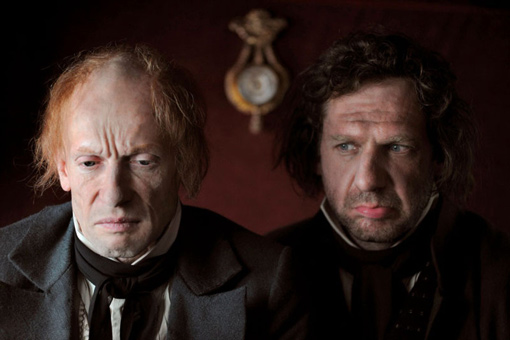
Faust is Russian director Aleksander Sokurov‘s take on the famous story of a man who bargains with the devil for knowledge of the profound, with a young hottie thrown in the deal for good measure.
I saw this film primarily because I had admired Sokurov‘s Russian Ark, a 19th century period drama in which an aristocrat wanders through St. Petersburg’s Hermitage and encounters figures from earlier in Russian history. Sokurov filmed the entire 99-minute movie in a single shot. That’s a gimmick, but even beyond the singular achievement of the one shot, Russian Ark is a complete and effective film.
The German language Faust is also strikingly original. Filmed in the Czech Republic, Sokurov vividly creates a grimy and economically depressed German town of the early 1800s. The alleys, doorways and staircases are all so narrow that people are constantly jammed together. Sokurov’s Faust is not an old man, but a 40-year-old beaten down by poverty and malaise. Similarly, his Mephistopheles is not a slick charmer, but physically gross and repellent character who is a canny manipulator.
Unfortunately, the originality is for naught, because the film fails to engage the viewer. You watch Faust with the indifference one feels while observing someone park a car awkwardly.
Faust’s Aspect Ratio is a TV-like 1.37 : 1 (but goes wider for the final scene), which is odd for a literary epic. And some of the scenes are filmed through a distorted lens for some reason. The 140 minute length just contributes to the sense of self-indulgence by Sokurov. It’s not a pleasant way to spend 140 minutes of your life.
